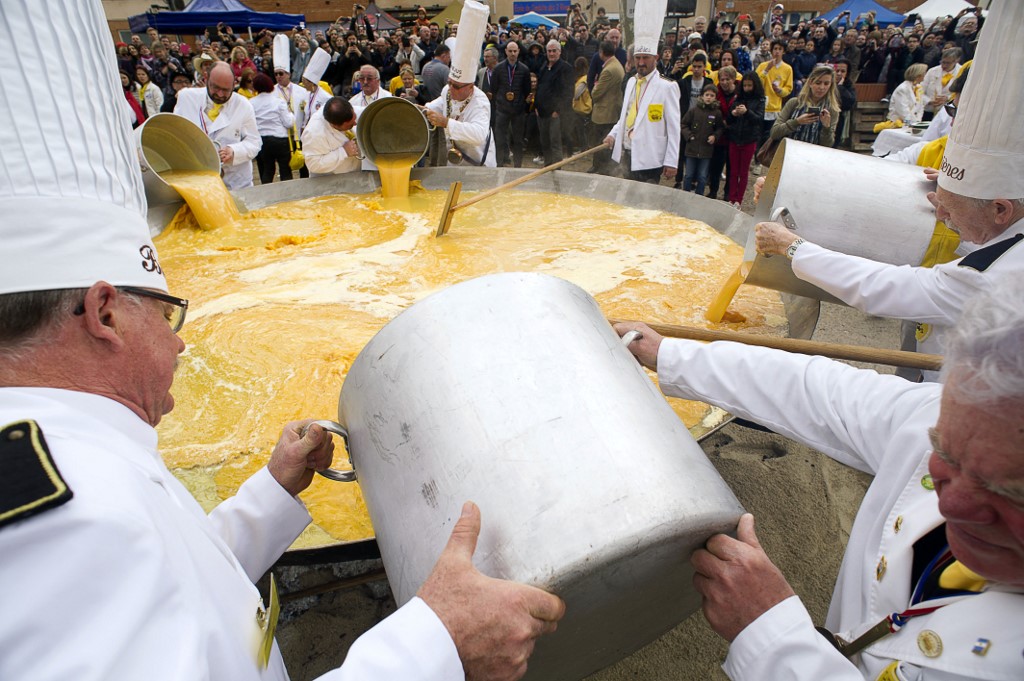How to have a traditional French Easter

Fish, flying bells and - of course - lots of chocolate. As Easter approaches, here's how to celebrate in the French style.
Holidays
France is, famously, a secular state, but it also has plenty of days off work for Christian holidays. At Easter most of the country gets just one day off - Easter Monday which falls on April 1st this year.
However if you are in Alsace-Lorraine you get both Good Friday (March 29th) and Easter Monday off - it's complicated and it's to do with war with Germany and trade unions.
French schools also get a two-week holiday around the Easter period, at different dates depending on the school holiday zones.
Flying bells
The first thing that happens over the Easter weekend in France is that all the church bells fly to Rome.
No, really.
French Catholic tradition says that on Good Friday, all church bells in France sprout wings and fly down to the Vatican to be blessed by the Pope.
READ MORE: Why is Good Friday not a holiday in (most of) France?
So no church bells ring between Friday and Easter Sunday morning, to commemorate the death of Jesus (and because they’re all in Rome, obviously).
After their getaway to Italy, the bells return to France laden with goodies for well-behaved children – namely chocolate eggs.
Chocolate
Which brings us neatly to eating chocolate.
As with most countries, chocolate is very much the foodstuff of Easter and you will already see shelves full of chocolate eggs in supermarkets and patisseries.
As well as eggs, chocolate bunnies and chicks are also popular, plus chocolate bells and chocolate fish – a reference to the poisson d’avril.
Special cakes
As well as chocolate, the windows of boulangeries and patisseries also display beautifully decorated cakes and pastries.
There isn’t a particular traditional Easter desert in France, but it wouldn’t be a celebration without getting something from the patisserie to end the Easter meal.
Anything with chocolate is popular, particularly cute little chocolate nests, and seasonal fruit like the first strawberries are often seen too.
Easter egg hunt
A lot of towns organise a chasse aux oeufs (egg hunt) and several of France's most beautiful chateaux also organise a hunt, so you can admire the stunning architecture and gorgeous gardens while the kids get hyped up on sugar and hunt for eggs.
Another rather messy tradition in some parts of the country is egg rolling or egg tossing. Raw eggs are either rolled down a slope or thrown into the air, and the last person to keep their egg intact gets a forfeit of chocolate from the other players.
Easter lunch
Easter is generally seen as a family occasion, and most French people will have lunch with relatives or friends. Since the schools are on holiday, many families travel to visit grandparents.
Lamb is the traditional Easter food, symbolising Jesus and also new life, but plenty of people just serve what they like.
If you either can't cook or can't be bothered, a lot of restaurants do open on the Sunday, although it might be wise to book in advance.

Members of the Giant Omelette Brotherhood of Bessieres pour eggs as they cook a giant omelette. Photo by REMY GABALDA / AFP
Omelettes
The town of Bessières in south west France creates a 15,000-egg omelette on Easter Monday for the whole town to share, in a tradition that apparently dates back to Napoleon.
Hooded figures
And if you're in Corsica over the Easter weekend, you might see a hooded man chained to a cross.
Don't panic, this is perfectly normal, part of the traditional Catholic festival on the island and people volunteer to be the one on the cross.
Comments
See Also
Holidays
France is, famously, a secular state, but it also has plenty of days off work for Christian holidays. At Easter most of the country gets just one day off - Easter Monday which falls on April 1st this year.
However if you are in Alsace-Lorraine you get both Good Friday (March 29th) and Easter Monday off - it's complicated and it's to do with war with Germany and trade unions.
French schools also get a two-week holiday around the Easter period, at different dates depending on the school holiday zones.
Flying bells
The first thing that happens over the Easter weekend in France is that all the church bells fly to Rome.
No, really.
French Catholic tradition says that on Good Friday, all church bells in France sprout wings and fly down to the Vatican to be blessed by the Pope.
READ MORE: Why is Good Friday not a holiday in (most of) France?
So no church bells ring between Friday and Easter Sunday morning, to commemorate the death of Jesus (and because they’re all in Rome, obviously).
After their getaway to Italy, the bells return to France laden with goodies for well-behaved children – namely chocolate eggs.
Chocolate
Which brings us neatly to eating chocolate.
As with most countries, chocolate is very much the foodstuff of Easter and you will already see shelves full of chocolate eggs in supermarkets and patisseries.
As well as eggs, chocolate bunnies and chicks are also popular, plus chocolate bells and chocolate fish – a reference to the poisson d’avril.
Special cakes
As well as chocolate, the windows of boulangeries and patisseries also display beautifully decorated cakes and pastries.
There isn’t a particular traditional Easter desert in France, but it wouldn’t be a celebration without getting something from the patisserie to end the Easter meal.
Anything with chocolate is popular, particularly cute little chocolate nests, and seasonal fruit like the first strawberries are often seen too.
Easter egg hunt
A lot of towns organise a chasse aux oeufs (egg hunt) and several of France's most beautiful chateaux also organise a hunt, so you can admire the stunning architecture and gorgeous gardens while the kids get hyped up on sugar and hunt for eggs.
Another rather messy tradition in some parts of the country is egg rolling or egg tossing. Raw eggs are either rolled down a slope or thrown into the air, and the last person to keep their egg intact gets a forfeit of chocolate from the other players.
Easter lunch
Easter is generally seen as a family occasion, and most French people will have lunch with relatives or friends. Since the schools are on holiday, many families travel to visit grandparents.
Lamb is the traditional Easter food, symbolising Jesus and also new life, but plenty of people just serve what they like.
If you either can't cook or can't be bothered, a lot of restaurants do open on the Sunday, although it might be wise to book in advance.

Omelettes
The town of Bessières in south west France creates a 15,000-egg omelette on Easter Monday for the whole town to share, in a tradition that apparently dates back to Napoleon.
Hooded figures
And if you're in Corsica over the Easter weekend, you might see a hooded man chained to a cross.
Don't panic, this is perfectly normal, part of the traditional Catholic festival on the island and people volunteer to be the one on the cross.
Join the conversation in our comments section below. Share your own views and experience and if you have a question or suggestion for our journalists then email us at [email protected].
Please keep comments civil, constructive and on topic – and make sure to read our terms of use before getting involved.
Please log in here to leave a comment.